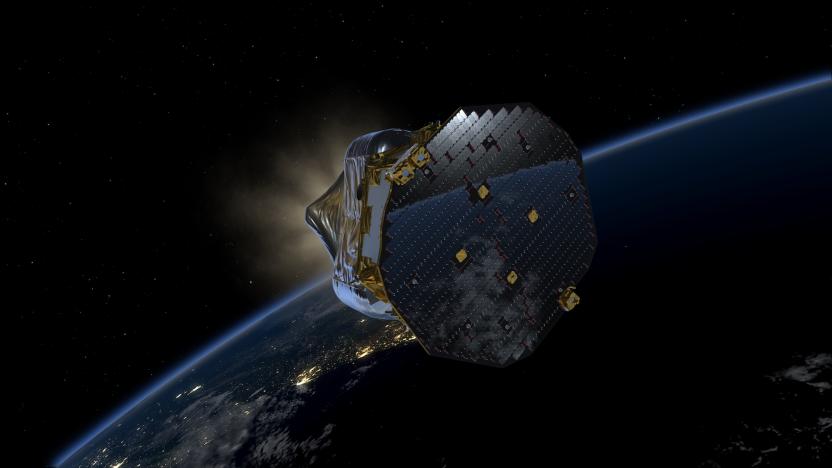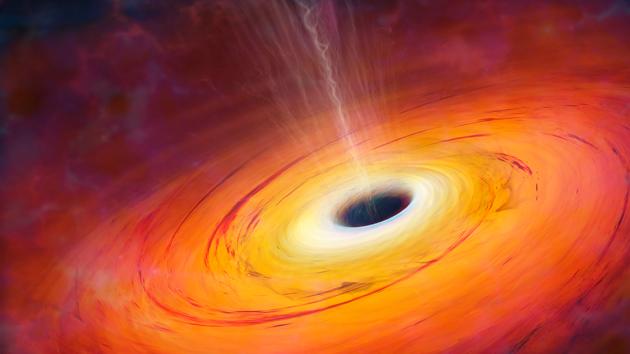generalrelativity
Latest

The first gravitational wave discovery wasn't a fluke
If you were worried that the first confirmed detection of gravitational waves was just a one-off result... don't be. Researchers analyzing LIGO data have verified a second instance (recorded in December 2015) where two black holes merged and produced the hard-to-spot behavior. The circumstances are decidedly different this time around, though. Ars Technica observes that the black holes were much smaller than those in the first instance, and spent more time on their collision course. While that offered more data to collect, the reduced intensity also introduced more errors -- it was harder to determine the masses of these holes.

Gravitational waves are our window into the early universe
"We have detected gravitational waves. We did it," David Reitze, executive director of the Laser Interferometer Gravitational-Wave Observatory (LIGO), said at a press conference in Washington on Thursday. Reitze has good reason to be excited. LIGO's find is a huge, Nobel Prize-worthy accomplishment on par with CERN's discovery of the Higgs particle in 2012. Just as Higgs particles revolutionized the standard model of physics, gravitational waves are set to do the same to Einstein's theory of general relativity. Simply put, it will fundamentally alter how we view and interact with the universe around us.

Watch ESA explain how it plans to find gravitational waves
In just under a week the European Space Agency (ESA) will launch its LISA Pathfinder spacecraft on a Vega rocket. Buried within the vessel are two cubes made of gold-platinum which, scientists hope, can lay the groundwork for measuring gravitational waves in space. The theories and testing procedures can be tricky to wrap your head around, but thankfully the ESA has made some explainer videos (below) to help you out.

Researcher finds a way to mimic curves in space-time
Here on Earth, it's rather difficult to replicate curved space-time -- to get that kind of effect in nature, you'd have to get uncomfortably close to black holes and other distant space objects. However, researcher Nikodem Szpak may have found a way to simulate that bend without facing oblivion. His proposed technique puts supercooled atoms in an optical lattice created by a laser field; so long as the laws of quantum mechanics and thermodynamics hold true, the atoms should behave like they're experiencing curved space-time. You can even change the lattice's pattern to mimic different circumstances, whether it's a moment right after the Big Bang or the surface of a star.

Scientists prove cosmological speed limit, time travel moves a little further out of reach
The cosmological speed limit remains unbroken. A team of researchers from the Hong Kong University of Science and Technology, led by Du Shengwang, claim to have proven that a single photon is incapable of traveling faster than light. The support for Einstein's special theory of relativity all but rules out the simplest form of time travel -- breaking the universe's traffic laws to condense time within a vessel. Don't get freaked out though, this doesn't mean time travel is impossible, only that it will be much more difficult than firing up a warp drive. General relativity still holds hope for bending and ripping the space-time continuum to meet our eon-hopping desires. Looks like it's time to get working on our flux capacitor technology.

String theory finds an elegant use for itself with qubit entanglement and black holes
Sure, trying to wrap your head around string theory -- a study in particle physics that's trying to rectify the perceived contradictions between general relativity and quantum mechanics -- can cause more cognitive pain than a colliding god particle. That hasn't stopped anyone from trying to validate its corollaries, and in the interim, researchers like Michael Duff of the Imperial College London. Mr. Duff realized a few years ago there existed some strong relations between formulas pertaining to both black holes (relativity) and four entagled qubits (quantum mechanics). So, in his words, "In a way, there's bad news and good news in our paper. The bad news is, we're not describing the theory of everything. The good news is, we're making a very exact statement which is either right or wrong. There's no in between." We're sure some science cliques are already gearing up to get their troll on. Hit up the PDF below if you want to read it yourself.



